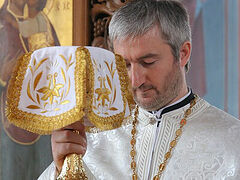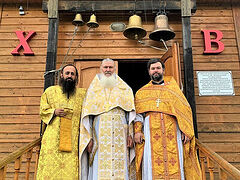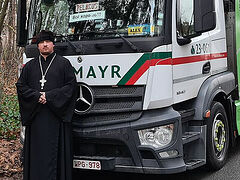—Are there any distinctive characteristics in your parish life? In what language do you celebrate? Do you observe any local traditions and any special feasts?
—We serve in two languages: Church Slavonic and Spanish. I try to cater to the needs of our parishioners. If I see people from the Russian Embassy who do not know Spanish, I try to celebrate in Slavonic. If I see my compatriots who have been living in Panama for a long time and know Spanish well, I can hold a service in that language. I know parishioners who love Slavonic, and if they are the majority, then I serve in it. Sometimes my compatriots say: “We understand services in Spanish better, and there are many words in Slavonic that we have forgotten; but when you serve in Spanish everything is clear to us.” Both in Argentina and Panama the language was a complicated issue. Sometimes as a compromise I serve in two languages.
There are no specially loved feasts so far… We are in the process of growing. Panamanians are beginning to integrate into Church life. For them Communion and the Liturgy are very important—they live by that. Maybe some specially venerated feast, relics and icons will appear in due time. But at present they first of all live the Eucharistic life.
We have a community of nuns attached to the church. The clergy house is big: the priest lives on one side (the church is right there), and a refectory and the sisters’ quarters are on the other side. Several sisters came here from Russia and they help us at services; they read, sing, organize public meals and keep the large church area clean. We can serve on weekdays thanks to this monastic community, because the choir comes only once a week—on Sundays. We can celebrate the Liturgy several times a week and can perform our monastic rule daily—in the morning and in the evening.
One of the nuns paints icons. At first, we even had a school of icon-painting. About ten people from among my compatriots and locals signed up to this school and began to paint icons. But then the pandemic broke out, and it was hard for people to get out of it, so now classes are rarely held. A Colombian priest asked permission for his sister to come to Panama for twenty days to study icon-painting. We have such a “missionary camp” here, as it were. Sometimes I travel to other countries, and sometimes we receive Latin Americans from other countries. Some come for a month, others—for three. Over the time of my stay here four people have already lived here for a long time; they became permanent church-goers, travelled back home, and continue to be in touch with us. One married man is studying at a seminary, but continues to read the midnight service in Spanish with us by video link. And other people who stayed here and discovered Orthodoxy have a desire to return. We have the custom of helping locals integrate into Church life by fully immersing themselves in the life of the Russian parish, performing the prayer rule and carrying out their obedience.
—Tell us about the most interesting events in parish life in recent years.
—One of the recent events we held was an evening of Russian culture. We made Russian dishes and talked about them to the Spanish-speaking parishioners. We talked about folklore, read Alexander Pushkin’s poetry translated into Spanish, talked about Russian costumes and even held a master class on Russian dance and circle dances. The Panamanians really enjoyed it, it unites them and knits them together. We have three families who came from Canada, so we also plan to hold an evening of Canadian culture. We hope that in the future we will have a series of such cultural events.
 There are lots of events. Together with the Coordinating Council of Russian Compatriots (CCRC) of Panama, we hold the Candle of Memory and the Picture of War memorial actions. As part of the Garden of Memory memorial action we plant trees or bushes, decorating the church grounds. We actively collaborate with the Coordinating Council of Russian Compatriots. We hold events in the Maslenitsa week before Lent, but we do not burn an effigy in contrast to secular carnivals. But this becomes an occasion for those who once studied in Russia and our compatriots to get together, to talk, to enjoy Russian cuisine, to spend time together in nature.
There are lots of events. Together with the Coordinating Council of Russian Compatriots (CCRC) of Panama, we hold the Candle of Memory and the Picture of War memorial actions. As part of the Garden of Memory memorial action we plant trees or bushes, decorating the church grounds. We actively collaborate with the Coordinating Council of Russian Compatriots. We hold events in the Maslenitsa week before Lent, but we do not burn an effigy in contrast to secular carnivals. But this becomes an occasion for those who once studied in Russia and our compatriots to get together, to talk, to enjoy Russian cuisine, to spend time together in nature.
—Do you manage to interact with representatives of other Christian denominations and other faiths?
—Not really. Everyone lives in their own world. Yesterday a Ukrainian woman from a Protestant sect visited us. She spoke quite reasonably and soberly (she loves her homeland very much). She gave donations and clothes for those in need. But this is communication on a personal level. Although this happens once a year.
One day we went on a missionary trip to a hospital for patients with AIDS. We brought them food, supported them and talked with them. But it turns out that the Catholic Church pastored this hospital very actively, arranging events, holidays, trips, etc… The Catholic Church in Panama keeps its finger on the pulse. Catechism and the Law of God are part of their school curricula. It is hard for us to compete or cooperate with them, because their presence is everywhere. There are Catholic churches in prisons and hospitals. In general, we are not wanted there.
—How are your relations with the State developing? Does it support or, on the contrary, impede the activities of your community?
—It depends. Some support and encourage our presence in personal relations. But they are afraid to declare it officially. It may affect their careers as it is “friendship with Russia”. The U.S. is very vigilant about the Government of Panama.
Since we live in the Panama Canal zone, where many pro-American and pro-British neighbors live, all of our steps for the development, construction of a church or organization of events are monitored, though not openly impeded—calls are always made to the police to find out whether we meet legally and whether we have permission. They’re not happy that we’re here.
There is an American school opposite the church, and our domes annoy them. A Russian church in the center of an American district! We have to be very cautious about every step. They can harm us seriously if we are very active in showing our presence here.
When we meet our neighbors in person, they smile, but this is a distinctive feature of Latin America. They cannot quarrel, but they always call the police or the higher-ups. An example: One day our parishioners arrived late, at eight o’clock. The caretaker at the American school played loud music, and it lasted for quite a long time. I thought it was his favorite song, that he would listen to it and then turn it down. But it didn’t stop. And our parishioners promised to call the school principal in the morning. This shocked me; in Russia we always talk to people in person first, and if they get into conflict with us, then we can call the principal. But the Panamanians are different. The first thing that comes to their mind is to call the principal, although outwardly they are always friendly. But, knowing these specifics, you can coexist with them.
—In your opinion, what is the challenge of our time for Orthodox Christians? Perhaps specifically in Panama?
—I see social media and gadgets as a serious challenge. Even for adults it is a test, and for young people it is even tougher. Addiction develops very quickly. Of course, it is hard for a Christian in the modern world to remain a Christian, because the uncontrolled flow of information is hard to bear. A person comes home from work, and instead of having a rest he mindlessly scrolls through the social media feed. I still don’t know how to deal with it. Should I say to young people, “Don’t use social media”? But it’s impossible for them to give up social media. I don’t have a solution so far, but I see that this is a serious challenge for Christians. Spending time on gadgets destroys your entire spiritual foundation.
—What is the main lesson that you have learned over the years of your ministry?
—Vladyka once told me: If the water in the lake is not bailed out and the plants around are not watered, the water blooms, and the plants wither. To ensure that the water is always fresh and everything around grows, you have to water everything around with this water. If you transfer these words to a priest’s life, for me this is a rule. It is necessary to do something all the time, to water everything in the neighborhood with the water that the Lord gives me. Everything around blossoms, and it does not go bad inside.
—If pilgrims (or travelers) from Russia come to Panama, which places would you advise them to visit?
—Of course, this is the Panama Canal. There is also the Panama Canal Museum. You can see how ships are lifted in the locks. There is the “Panamanian Switzerland” on the border with Costa Rica—the province of Chiriqui. There are tourist routes to the Baru volcano—the highest point in Panama.
—What words from the Holy Scriptures especially inspire and support you in difficult moments of life?
—When it comes to difficult moments of life, the following words of the Lord come to my mind: The cup which My Father hath given Me, shall I not drink it? (Jn. 18:11). St. Ignatius (Brianchaninov) says: “It is not Pilate, it is not the soldiers who give the cup, but the Father gives the cup to His Son to drink.” In difficult moments I recall these words.
When it comes to missionary work, the words from the Gospel read on the feasts of the holy hierarch are close to my heart: And other sheep I have, which are not of this fold: them also I must bring, and they shall hear My voice; and there shall be one fold, and one Shepherd (Jn. 10: 16). And also: Go ye therefore, and teach all nations, baptizing them in the name of the Father, and of the Son, and of the Holy Ghost (Mt. 28:19).







